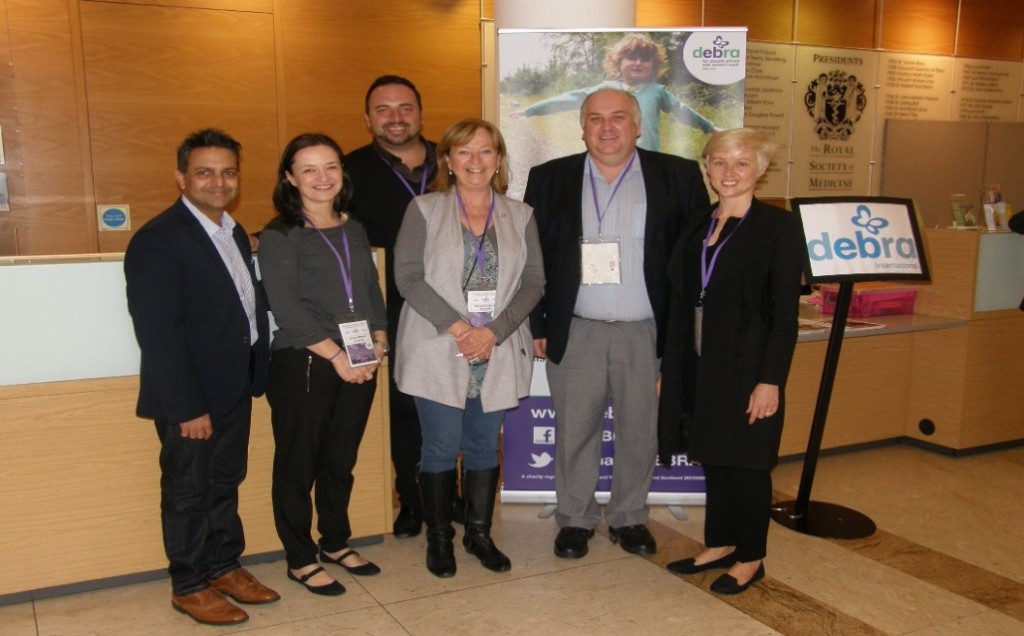EB-CLINET and DEBRA INTERNATIONAL Conference 24-26th September 2015

For the first time, EB-Clinet and DEBRA International conferences were held at the same time and have shared one day of the programme. This resulted in a record breaking attendance to date, both in terms of delegates and countries represented, with over 320 delegates from 35 countries enjoying these conferences (including seven Australian representatives from DEBRA-Aus, nursing, healthcare and research professionals). This forum provided excellent opportunity to share knowledge and expertise and make important networking connections over the few days. The program covered a wide range of clinical and research projects and included presentations on different successful programs from various DEBRA organisations around the world.
Number of research talks at these conferences involved both epidemiological studies, new research projects and current clinical trials around the world. Fiona Browne presented the epidemiological data on EB in UK, to show similar prevalence figures to those reported in USA and Australia and highlight that at least 30% of mild cases do not engage with health professionals or want to be part of registries. This highlights the importance of DEBRA registries around the world. Following these talks, a workshop on an Outreach model of care by EB nurse specialists in UK showed that our programs in Australia which include, hospital based and community nurses, neonatal boxes, and a Family support coordinator, cover most of the aspects of care provided for patients in UK. Main difference was that UK nurses do have more freedom in hospital visits and coordinate the home visits a month in advance to patient’s attendance to EB clinic in the hospital and this aids both patients and specialists in providing better care and is perhaps the model we should consider adopting if possible. Additionally, nurses and doctors in UK use telemedicine and have a team of psychologists and social workers available to provide better care and counselling to EB patients and families.
The highlight of the research talks was the inspirational plenary lecture by John McGrath presenting latest research update on protein, gene and cell therapy trials. Intravenous injection of type VII collagen has been currently halted in clinical trials due to toxicity issues in the liver with this approach, while new developments include using microneedle delivery of type VII collagen using specialized dressings however this approach is still under development. Gabriela Petrof presenting data on the Phase I results of the allogenic mesenchymal stromal cell therapy showing high number of adverse effects associated with odour, and development of anti-Col7a1 antibodies in 9 out of 10 patients, however these were not pathogenic. On the positive side, this therapy improved the rate of wound healing, reduced redness, itch and pain therefore improving the quality of life. Clinical benefits lasted for 4-6 months and Gabriel concluded that further studies are required with more patients, placebo control, and randomised control trial design, as reported findings were subjective and there was no evidence of new Col7a1 formation or correlation with different inflammatory markers. Clare Robinson from DEBRA International highlighted that DEBRA International is placing increasing emphasis or equal opportunity for symptom relief research as much as research focused on development of the cure. She outlined different current clinical trials focused on improvement of wound healing and pre-clinical trials using anti-inflammatory and anti-scarring therapies. This was followed by the presentation by Jacob Tolar on the progress of bone marrow transplantation as an effective treatment to halt the progression of the disease however the current patients that have undergone the procedure are seeing short lasting effects and advise caution on such risky procedures until the safety aspects improve.
Different DEBRA group representatives working as panels presented programs and services they offer in their countries and how they got there, discussing community support they offer, opportunities with charity retail, and different fundraising opportunities. Michael Fitzpatrick presented an inspirational talk on what families want, bringing the focus back to patients and families and different DEBRA groups doing their best to provide the best services we can to support those families in need. A highlight quote of this session was that “Parents need to know that asking for help is OK, and that doing so does not make them bad parents”. Common themes that were repeated included the need for better multi-disciplinary care of patients including psychological support, continued development of the best practice guidelines, stronger support of professional community to develop careers focused on EB, increased fundraising initiatives at local, national and international level, as well as importance of increased information and knowledge sharing. DEBRA International Marketing Advisory Group highlighted the challenges different DEBRA groups acknowledging that there are political and cultural challenged, branding issues, it is difficult to fundraise for research, social media is important, retail model works well in number of countries and that long term media interaction pays off. It was agreed that different DEBRA groups need to share resources, videos, merchandise, promote each other campaigns, and set globally known ambassadors that can be utilized by all groups. These discussions were followed by the panel presentations from EB Without Borders team, presenting an update on their current achievements and future plans. It was really inspirational to see that this program has helped so many countries and aided in establishment of new DEBRA groups. It is with excitement that we all look forward to the next conference to find out both the progress from research trials and DEBRA international as there are many great projects coming to fruition.
Zlatko Kopecki
